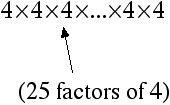
EXAMPLE 3.1.9
Gomer has to take a 25 question multiple-choice test, but he hasn't studied. He will guess at each problem. For each problem th epossible responses are A, B, C, or D. In how many different ways is it possible to answer the test questions? How likely is it that he will get a score of 100%?
SOLUTION
In this case Gomer has to make 25 decisions. For each decision there are 4 options. According to the Fundamental Counting Principle the number of outcomes is:

=425
![]()
This is the correct answer. However, we are going to try to put this answer, which is a very large number, into perspective.
The answer is so large that the calculator presents it in scientific notation. (On your calculator the display may look like this: "1.125899E15" or "1.1125899 15." You need to understand that this is the calculator's way of displaying scientific notation.)
First we will convert the answer to standard notation. To convert from this number from scientific to standard notation we include enough trailing zeros so that we can move the decimal point 15 places to the right:
1,130,000,000,000,000
This number is about "1.13 quadrillion."
One way to make sense of a large number is to compare it to another, more familiar large number. For instance, there are about 6 billion people on Earth.
6 billion = 6,000,000,000, or in scientific notation,
![]()
Let's divide 1.13 quadrillion by 6 billion:

What this means is that if every person on Earth took the 25-question test 190 thousand times, and guessed at every question, it would be reasonable to expect that only one person would get a score of 100%.